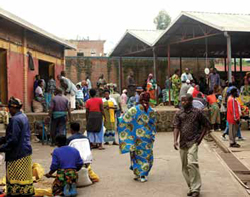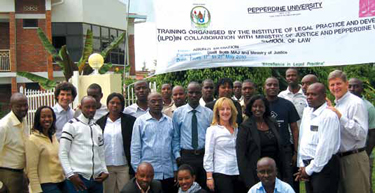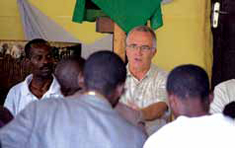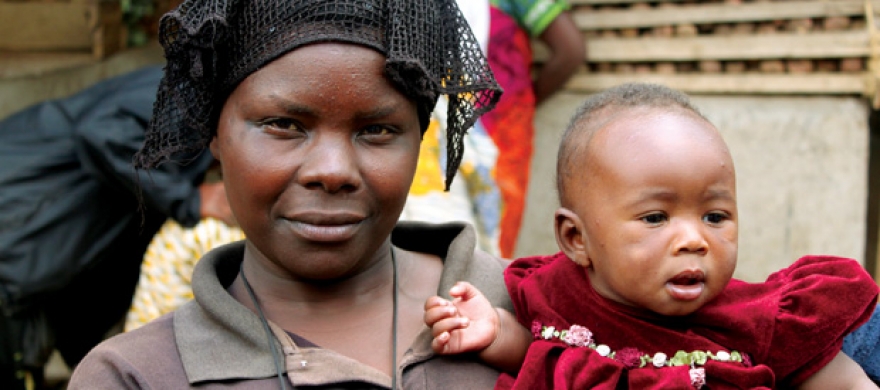The Power to Heal
Equipping community leaders in Rwanda with the skills they need to bring reconciliation to their fractured nation.
Outside Rwanda's capital city of Kigali stands a mournful Catholic church. In April 1994 more than 10,000 people fled violent rampages nearby and sought refuge in the sacred space. They all were killed, however; their skulls and bloodied clothes remain inside 16 years later. Such memorials—and memories—of the atrocities pervade the Rwandan national conscience today. As families recover from unmentionable losses and neighbors confront the brutality they inflicted on one other, the need for healing and peaceful conflict resolution is as strong as ever.

Reconciliation has emerged as the motivating impulse behind the nation's legal system.
Scores of attorneys, judges, and law professionals were killed in the genocide, resulting in severe underrepresentation during a time when 150,000 new legal cases needed resolution. To cope, Rwandans have returned to traditional practices, relying on village elders elected to serve as "Abunzi." They encourage disputants to reach an agreement, but will issue a binding decision if necessary. Rwandans also seek guidance and advice from pastors, who carry moral authority in their communities.
A widow returns to her village 15 years after the genocide and finds a man and his family living on her land. The man is very rich and politically powerful and she is afraid to assert her rights. When we debriefed, all the groups had settled except one. It is great to see them learning and using our concepts and techniques.
This summer representatives from the Pepperdine School of Law set out to help these critical groups of Rwandan leaders foster reconciliation between their countrymen. Collaborating with the Justice Task Force of the Saddleback Church, experts from Pepperdine's Straus Institute for Dispute Resolution worked with lawyers who train the Abunzi in mediation skills. Also in partnership with Saddleback, lawyers from Pepperdine's Nootbaar Institute on Law, Religion, and Ethics dedicated their time to training pastors about laws concerning domestic violence and property-grabbing from widows.
"People who participated in the killings are being released from jail and returning to their villages where they committed their crimes. Rwanda is in a unique situation because the perpetrators and victims of genocide are living next to each other again," says Peter Robinson, managing director of the Straus Institute and associate professor of law. "The wounds of this country run very deep. There is a lot of need for healing, for reconciliation. There's a lot of work that needs to be done."
 More than 30,000 Abunzi serve as mediators throughout Rwanda, successfully resolving
the majority of issues brought before them.
More than 30,000 Abunzi serve as mediators throughout Rwanda, successfully resolving
the majority of issues brought before them.
Should individuals require the assistance of an attorney, however, they can consult
one through an Access to Justice Center. These attorneys—numbering in the mere hundreds
for a national population approaching 10 million—provide legal aid, train the Abunzi
in mediation skills, and educate them in recent changes or developments in the law.
Each attorney is responsible for sharing his or her knowledge with more than 1,000
Abunzi leaders; their time is scarce and resources are few. Adding the fact that bringing
a case to trial can be prohibitively expensive for the average Rwandan, the Abunzi
play a crucial role in dispensing justice.
During their stay in Rwanda Robinson and his colleagues, Straus alumna Alisa Freundlich (LLM '10) and student Todd Nichol, set out to train these trainers. They conducted educational sessions for Access to Justice lawyers in mediation and dispute resolution so that they, in turn, could strengthen the Abunzi for their hands-on work.
The Straus team started with best practices and a formal crash course in what the institute does best (in 2010 Straus was ranked No. 1 in the nation by U.S. News & World Report for the sixth consecutive year). Mediation, Robinson explains, occurs when a neutral person is asked to help two other parties find a resolution. The process begins with a communication stage, during which each party presents their case and how they perceive the problem. Next the mediator facilitates negotiation, finding ways to creatively problem-solve and reach a compromise. In the final stage the mediator reminds each party of the advantages of reaching an agreement, but lets the parties decide between resolving the matter with a voluntary agreement or with a judge's decision. "The mediator has to find a way for people to say, 'okay, I'll agree to that.' It may not be the perfect agreement, but perhaps it's better than the alternative. People need to find solutions that they can agree with and buy into," he says.
Equipped with this understanding, the group focused extensively on mock mediations and used case studies that Freundlich had researched and prepped. In one session they addressed a common scenario born from a power imbalance: "A widow returns to her village 15 years after the genocide and finds a man and his family living on her land," Freundlich explains. "The man is very rich and politically powerful and she is afraid to assert her rights. When we debriefed, all the groups had settled except one. It is great to see them learning and using our concepts and techniques."
Both the Abunzi and Rwandan pastors witness how challenges arise when traditional customs butt against modern law.
This is particularly evident when it comes to property-grabbing and domestic violence. "These are common practices in Rwanda," says Bob Cochran, director of the Nootbaar Institute and the Louis D. Brandeis Professor of Law. "We are trying to get pastors involved as a part of the solution through teaching their congregations and counseling people in their churches."
 Property or land grabbing from widows occurs when a man dies who has not created a
will or married legally (informal marriage arrangements are common in Rwanda), suddenly
leaving widows or children to provide for themselves. The expense of a dowry traditionally
discourages legal marriage, while writing a will instills in the men a fear of death.
"They are really wrestling with important, difficult issues," says Cochran, who was
joined in Rwanda by student Janelle White and alumnus Aaron White (JD '09). "Should
the church stand up to traditions that will alienate people? Should the church ever
recommend that someone go to the police?"
Property or land grabbing from widows occurs when a man dies who has not created a
will or married legally (informal marriage arrangements are common in Rwanda), suddenly
leaving widows or children to provide for themselves. The expense of a dowry traditionally
discourages legal marriage, while writing a will instills in the men a fear of death.
"They are really wrestling with important, difficult issues," says Cochran, who was
joined in Rwanda by student Janelle White and alumnus Aaron White (JD '09). "Should
the church stand up to traditions that will alienate people? Should the church ever
recommend that someone go to the police?"
The answer must be yes, so in conjunction with their sessions in Rwanda, the Pepperdine team developed manuals to assist the pastors with these tough decisions in the long term using familiar behavior patterns as the foundation. "The manuals show biblical grounds for opposing those kinds of actions, which pastors can draw from in their sermons," Cochran says. "There's a section on whether pastors should use, support, and turn to the law when these problems arise, as well as specific information on Rwandan law. The final piece is about what they can do as pastors." Years in the making and created with input from many Pepperdine people, the manuals have received wide support so far, and grow increasingly relevant as changes in Rwandan law (women's property rights and land-registration issues, in particular) exacerbate tensions that contribute to these behaviors. Contacts in Uganda have asked the team to adjust the manuals for the laws and language of that country, and there's opportunity for even greater expansion moving forward.
Ultimately the proof of usefulness will come from the mouths of Rwandans themselves. Tharcisse Karugarama, the country's equivalent to the United States attorney general, gave a speech at the conclusion of the Straus mediation program. Cochran, who was in attendance, vividly remembers how the justice minister described the impact they were making: "At one point he said to the group, 'These people (meaning Westerners) abandoned us in 1994 when we started to kill each other. The reconciliation training that they are doing for us now may keep us from killing each other again.'"
School of Public Policy students and other members of the Pepperdine community also have committed their time and expertise to work in Rwanda. Read their stories: magazine.pepperdine.edu/rwanda
